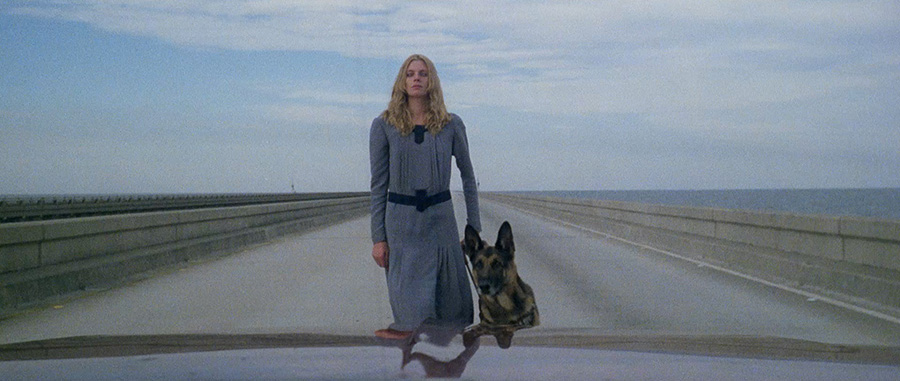THE BEYOND
Directed by Lucio Fulci. 1981. Italy.

Beneath a derelict hotel in Louisiana, a gateway to hell is opening. That is the concept behind Lucio Fulci's THE BEYOND. It's what it has instead of a plot.
Inspired by the French Surrealist Antonin Artaud and his writings on the theater (specifically his formulation of a new kind of theater, the confrontational Theater of Cruelty), Fulci devised THE BEYOND as an illustration of a single idea, that of death, the finality of it, the horribleness of it, the inescapable reality of it. Borrowing from Artaud's ideas, Fulci's film would be a low logic, low cohesion work where the narrative arcs would all revolve around images of violent death. Whether the film belongs to proper Surrealism or not is open for debate. I don't quite think it matters one way or another. Though I tend to classify THE BEYOND as an Absurd work rather than a Surrealist work, there is a whiff or two of UN CHIEN ANDALOU behind its construction. But all of that is just faux-intellectual posturing of one kind or another.
So what exactly is it about THE BEYOND that has made it such an enduring cult classic? Well, the strength of its imagery is perhaps the most common answer. While I personally find non-contextual cinematic violence (that is to say, violence for the sake of violence) to be much weaker than contextual violence (violence that grows naturally from a narrative, ie. the blood-soaked finale of THE WILD BUNCH), there is a definite effect to the violence on display here. Sure, it doesn't "mean" anything. Sure, it happens to random actors instead of characters, but Fulci's never-blinking camera and the gruesomeness of Giannetto De Rossi's make-up effects can deliver one hell of a gut punch to those with weaker stomachs. But that isn't the extent of the strong imagery here. The film contains a staggering number of interesting compositions and strong, instantly iconic moments, like the journey down a long, empty highway where Liza first encounters the blind woman Emily or the final closing moments which forever lock our characters in a Bosch-like hell from which there is no escape.
But impressive imagery can only get you so far. THE BEYOND was compromised by its German distributors who demanded that Fulci return to his trademark zombie violence. As a result, the final third of the film becomes a real endurance test. This is yet another Fulci zombie film where a character shoots the shuffling dead in the brain over and over, only to resort to ineffective body shots so that Fulci can pad out scenes. This is yet another Fulci zombie film where characters could just run right past the zombies and escape with absolutely no trouble. This is yet another Fulci zombie film where the pacing dies completely, stalling the film for what seems like forever just so we can get a few dozen close-ups of badly made-up zombies drooling and stumbling towards the camera. Leaving the confines of the Louisiana hotel might have been necessary for Fulci to get the money to make his film, but it comes very, very close to destroying the atmospheric success of the first hour.
Ultimately, when people discuss THE BEYOND, they tend to speak about it in visual terms (like I just did), but the major success of the film, in my opinion, comes down to the tone of it. It's a weird little film, the kind that moves from grotesque ocular violence to a laughable scene of a man having his obviously fake face devoured by obviously fake tarantulas. THE BEYOND completely refuses to be taken seriously, even if the violence on display is adult's only material. Fulci wanted to make a haunted house film here and the kind of gleeful, gawking geekshow material in this film fits that description to a T, even if the haunted house I'm referring to is of the amusement park variety. Even though the movie ends with a serious, almost depressing note of tragic finality, it exists in a fantasy-filled, darkly comedic universe where a child is in peril from a bubbling, frothing soup made from acid and the gooey sludge of her own mother's melted face. We go from a dog tearing out a woman's throat, the glut of blood reaching Las Vegas fountain proportions, to an inexplicably exploding window that shotguns glass into someone's face. The violence on display is driven to such ridiculous heights that the deaths become tantamount to funhouse attractions. It's this constant battle between a serious attitude and non-serious display of on-screen violence that makes THE BEYOND endlessly entertaining (barring the zombie-filled finale).
This is horror without purpose but it's also horror without agenda. It's a sometimes creepy, always gooey, nasty, gross, wonderful little film that might not have anything to say or even have logical ground to stand on, but succeeds through force of imagery, a maniacal tune of a tone and more than enough chuckles to make the flesh tearing fun, if still rather icky.